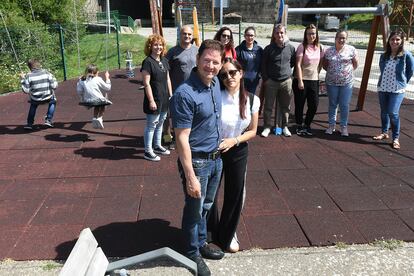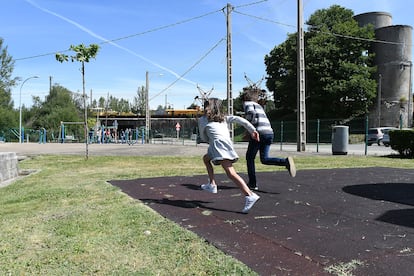The migrants bringing small rural communities back to life in Spain
Several projects run by non-profits are helping asylum seekers find jobs and housing in villages at risk of disappearing due to population exodus, such as Brañuelos in León province


A Colombian family who was living under threat from the local FARC guerrilla is now enjoying a peaceful life in a tiny village in Spain, thanks to a program to revitalize the country’s rural, depopulated areas.
The couple and their two children traded in the Colombian city of Cali, population three million, for Brañuelas (in Spain’s northern León province), which has 200 residents.
The family arrived in Spain in December 2019 and applied for asylum to avoid going back to Colombia, where the FARC was demanding some land from them. But they ran into a wall of paperwork and bureaucracy.
Everyone has been helping us, and that helps us build the communityR.O. and J.M. from Colombia
And then they heard about a project sponsored by the Diputación de León, a provincial government agency, in partnership with several associations. If they accepted to move to a remote village, they would be given jobs, help with housing, and their children would be admitted into the Spanish school system.
In exchange, Brañuelas would get an additional family, young blood and enough students to create a new class group.
There is a tremendous sense of peace and quiet outside a former railway warehouse that’s been transformed into a modern bar. Kids are running around in the garden, and the sun is shining down on the slate roofs and stone walls of the homes as R.O. and J.M., who asked to use only their initials, tell their story.
Seated around them are members of the non-profit groups that helped get them here. Also present is the mayor, Carolina López of the Socialist Party (PSOE), a supporter of the Nuevo Comienzo (New Beginnings) program. “These are the last trains going through our villages, we can’t see another future for ourselves,” says López about the initiative to attract migrants to low-density locations.

López keeps asking for better transportation connections, services and cellphone and internet access so that “villages will fill up.” The residents of Brañuelas are barely in touch with Astorga, the main municipality in the area, and the place where they go to get vaccinated or see a pediatrician. By car, it is a 40-minute drive, but taking public transportation entails an entire day due to the low frequency of buses.
The new families in town have already helped the local economy by creating enough clients for two more bars and a general store. “Everyone has been helping us, and that helps us build the community,” say its latest members. The Colombian family, which has been living here for nearly a year, also saw snow and experienced cold weather for the first time in their lives.
This sense of community is one of the things that newcomers appreciate the most. Parents are grateful for the fact that they can let their kids go out in the street and play, as there will always be someone out and about to keep an eye on them.
R.O. and J.M. say that with the savings they are building up – life in a small village is very affordable – they might open up a Colombian food business. “We feel like having our own business. We had one in Cali and we both enjoyed it very much,” they say, adding that they hope to be able to create jobs through their initiative and give something back to the community.
But their voices still express the frustration of the process that came before: their attempt at regularizing their situation in Spain, beginning with the Madrid police, who sent them to the Samur social services and the Red Cross; later came the move to Salamanca through an association named Accem, until the option of Brañuelas came up.
Lorena Alonso, who represents a charity group named Diaconía, underscores the need to help people find jobs and adapt to their new home, given the slow response times by institutions. Non-profits, working in coordination with the Migrations department, have been taking on a growing role in the mission to help asylum seekers. But in Spain, only 5% of requests for international protection get accepted, according to Interior Ministry figures, far below the European average. And proving three years of “arraigo social,” a way to obtain a temporary residency permit that requires proving local connections, such as a family link, also entails surviving for that long on subpar jobs that often entail “exploitation and lack of access to public services,” notes Vicente Guillán of the charity Cáritas León.
A similar program was conducted last year in La Alcarria, a region in Spain’s little-known Guadalajara province. Three Venezuelan families settled down in a village named Pareja, where a new classroom was opened to accommodate the new students. The parents pay the rent on their homes with the money they make through their jobs, thanks to the help they got from a group called Pueblos con Futuro (Villages with a Future).
Shattering stereotypes
The Colombian family now settled in León is also happy to have a personal life beyond work. The father works at a local business, picking heather that is used to weave poolside parasols, and the mother is a caregiver for senior residents.
The couple are keen to dispel commonly held stereotypes about foreigners living on handouts: “We have to prove that we are here to contribute something.” The children look puzzled when they are asked if they have felt welcome in the community, as though it were insultingly obvious that this was the case.
Antonio Morayo, 73, strolls through this traditional mining community, carrying a classic shepherd’s crook and wearing a modern cap with a panther drawing on it. He, like other locals sipping coffee in the sun, is grateful for the new arrivals. “They keep the villages alive, there are fewer and fewer people around,” he says. Besides the Colombians, there are also Senegalese and Gambian nationals working in the heather fields and helping defeat the gloomy forecasts about the impending death of Brañuelos.
English version by Susana Urra.
Tu suscripción se está usando en otro dispositivo
¿Quieres añadir otro usuario a tu suscripción?
Si continúas leyendo en este dispositivo, no se podrá leer en el otro.
FlechaTu suscripción se está usando en otro dispositivo y solo puedes acceder a EL PAÍS desde un dispositivo a la vez.
Si quieres compartir tu cuenta, cambia tu suscripción a la modalidad Premium, así podrás añadir otro usuario. Cada uno accederá con su propia cuenta de email, lo que os permitirá personalizar vuestra experiencia en EL PAÍS.
¿Tienes una suscripción de empresa? Accede aquí para contratar más cuentas.
En el caso de no saber quién está usando tu cuenta, te recomendamos cambiar tu contraseña aquí.
Si decides continuar compartiendo tu cuenta, este mensaje se mostrará en tu dispositivo y en el de la otra persona que está usando tu cuenta de forma indefinida, afectando a tu experiencia de lectura. Puedes consultar aquí los términos y condiciones de la suscripción digital.








































